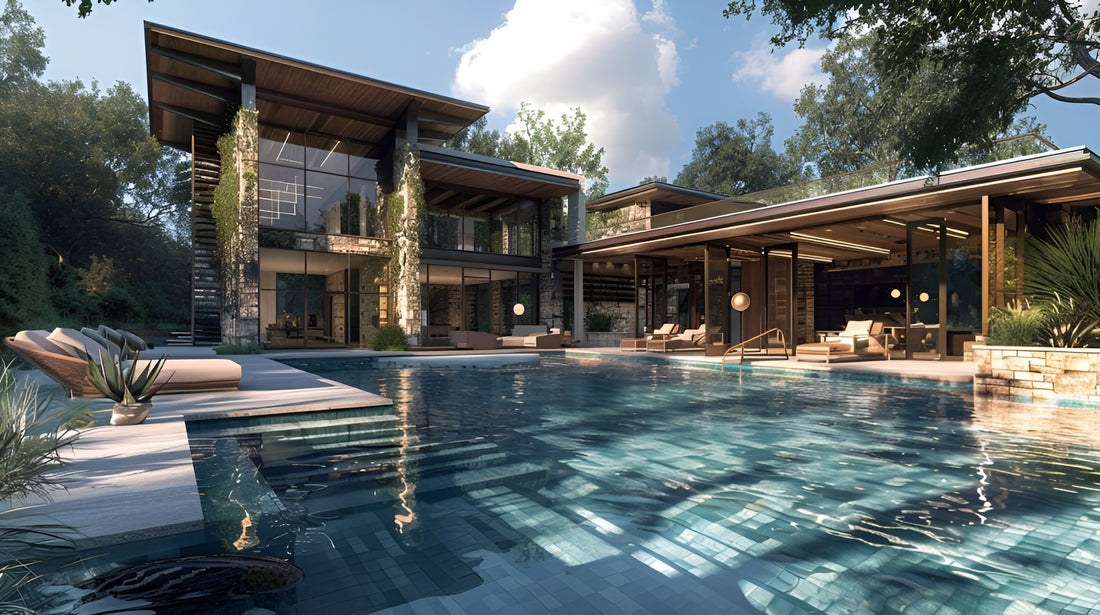Are you considering adding a pool to your property? Beyond the joy of swimming and relaxation, you may be wondering if it will increase your home's value. In this article, we will explore the impact of pools on your property's market appeal and potential resale value.
It's no secret that pools have long been associated with luxury and a desirable lifestyle. However, it's essential to evaluate the financial implications and consider various factors before taking the plunge. Let's dive in and examine the relationship between pools and home value.
Key Takeaways:
- Pools can enhance a property's market appeal and potentially increase its resale value.
- The growing demand for homes with pools and the lifestyle benefits they offer can attract potential buyers.
- Evaluating the financial impact of adding a pool can help determine if the investment is worthwhile.
- Factors like pool size, design, materials used, maintenance requirements, and location can influence the pool's value.
- Regional variations and pool demand play a role in the desirability and market value of homes with pools.
Assessing the Market Appeal of Pools
When considering the value of a pool in your property, it's important to assess its market appeal. Pools have seen a surge in demand as they offer both practical and lifestyle benefits, attracting potential buyers.
The market appeal of pools stems from the desire for a relaxing and enjoyable outdoor space. A well-designed pool can transform a backyard into a private oasis, providing a refreshing retreat from the heat and a focal point for socializing and entertaining. The addition of a pool can significantly enhance a property's overall aesthetics and create a sense of luxury.
Increasing Demand for Homes with Pools
Recent trends show a growing demand for homes with pools, especially in warm climates and areas known for their leisurely lifestyles. Many homeowners see pools as an extension of their living space, offering a dedicated area for recreation and exercise. Families with children often consider pools an attractive feature, providing a fun and safe environment for kids to play and make lasting memories.
Furthermore, pools have the potential to increase a property's desirability and stand out in a competitive real estate market. A well-maintained pool can differentiate a home from similar properties, attracting potential buyers who are seeking a unique and luxurious experience.
Lifestyle Benefits and Attraction for Buyers
Aside from the visual appeal, pools offer a multitude of lifestyle benefits that make them enticing to buyers. They provide a convenient option for relaxation and exercise, allowing homeowners to enjoy the benefits of swimming without the need for a public gym or club membership.
Moreover, pools can serve as a gathering place for family and friends, fostering meaningful connections and creating a space for memorable social gatherings. The ambiance created by a pool, complete with outdoor furniture, landscaping, and lighting, can enhance the overall atmosphere of a property, making it more enjoyable and inviting for residents and visitors alike.
In conclusion, the market appeal of pools is undeniable. They have evolved from being seen merely as a luxury amenity to a desirable feature that adds value to a property. By understanding the factors that contribute to their appeal, homeowners can make informed decisions about adding a pool to their homes, potentially increasing market desirability and attracting buyers.
Evaluating the Financial Impact
When considering the addition of a pool to your property, it is essential to evaluate its financial impact. One key aspect to explore is the potential resale value that a pool can bring. Will the investment in a pool yield a positive return?
Studies have shown that pools can indeed have a positive financial impact on a home. Homes with pools often enjoy increased market appeal, attracting buyers who value the lifestyle and recreational benefits that a pool provides. This high demand can potentially drive up the resale value of your property.
However, it is crucial to consider other factors that may influence the financial impact of pools. The location of your property, for example, plays a significant role in determining the desirability and value of a pool. In areas where pools are highly sought after, such as warm climates or neighborhoods with a strong emphasis on outdoor living, the financial impact can be more substantial.
Additionally, the quality and size of the pool can also affect its financial impact. A well-designed, spacious pool made with high-quality materials is likely to contribute more positively to your property's value. On the other hand, a poorly designed or neglected pool may have a negligible impact or even deter potential buyers.
Before making a decision, it's crucial to consult with real estate professionals who are knowledgeable about the local market. They can provide valuable insights into the potential resale value of a pool in your specific area.
While adding a pool to your property can have a financial impact, it's important to weigh the costs and potential returns. Careful consideration and research can help ensure that your investment enhances both your lifestyle and the value of your home.
Factors Affecting the Pool's Value
When considering the value of a pool, several factors come into play. These factors can influence the overall impact a pool has on the value of a home.
Pool Size
The size of a pool is a crucial element that affects its value. Larger pools tend to have a more significant impact on a property's value compared to smaller ones. Buyers often seek spacious pools that provide ample room for swimming and relaxation.
Design and Aesthetics
The design and aesthetics of a pool can greatly enhance its value. A well-designed pool that seamlessly integrates with the overall landscape and architectural style of the property can be a significant selling point. Features such as waterfalls, decorative tiling, and unique shapes can make a pool more appealing to potential buyers.
Materials Used
The materials used in constructing a pool can affect both its visual appeal and longevity. High-quality materials like durable pool liners, sturdy decking, and efficient filtration systems can increase the value of a pool. Buyers appreciate pools that are built to last and require minimal maintenance.
Maintenance Requirements
The maintenance requirements of a pool contribute to its overall value. Pools that are easy to maintain and have efficient cleaning and filtration systems can attract buyers who prefer a hassle-free ownership experience. On the other hand, pools that require extensive and costly maintenance may deter potential buyers.
Location
The location of a pool within a property can also affect its value. Pools that are strategically positioned to offer privacy, beautiful views, or easy access to outdoor entertaining areas can significantly enhance a property's appeal and value.
Considering these various factors when installing or renovating a pool can help homeowners make informed decisions that align with their goals and maximize the potential increase in their property's value.
Regional Variations and Pool Demand
When it comes to the demand for pools, regional variations play a significant role. Geographical considerations greatly influence the desirability and market value of homes with pools in different locations.
Regional pool demand is influenced by various factors, such as climate, culture, and lifestyle preferences. In warm and sunny regions, pool demand tends to be higher, as residents seek a refreshing escape from the heat. These areas often have a strong outdoor living culture, where pools are seen as an essential part of leisure and entertainment.
On the other hand, in regions with colder climates, pool demand may be lower due to limited usability throughout the year. Homeowners in these areas may prioritize other features or invest in indoor swimming facilities as alternatives.
Geographical considerations also come into play when evaluating the market value of homes with pools. Proximity to bodies of water, such as lakes or oceans, can influence the demand for pools. In coastal areas, a pool may be seen as less essential since residents have easy access to natural water sources. Conversely, homes located in landlocked regions may have a higher demand for pools as they provide a private oasis.
Another crucial geographical consideration is the neighborhood. Areas with higher property values and affluent communities often have a higher demand for pools as a symbol of luxury and prestige. In contrast, more modest neighborhoods may place less emphasis on pools, resulting in lower demand and potentially less impact on property value.
It is important for homeowners to understand these regional variations and geographical considerations when considering adding a pool to their property. Assessing the local pool demand and market trends will help determine the potential impact on both personal enjoyment and investment return.
Important Considerations Before Installing a Pool
Before making the decision to install a pool, homeowners should take into account several important considerations to ensure a successful and satisfying experience. These considerations include:
1. Cost
The cost of installing a pool can vary significantly depending on factors such as the size, design, and materials used. It's essential to establish a budget and obtain multiple quotes to determine the financial feasibility of the project.
2. Maintenance
Maintaining a pool requires regular upkeep and ongoing expenses. Homeowners should be prepared for tasks such as cleaning, chemical treatment, and equipment maintenance. It's crucial to consider the time, effort, and costs associated with pool maintenance before installation.
3. Insurance
Adding a pool to your property may have implications for your homeowners insurance policy. It's important to consult with your insurance provider to understand any potential changes in coverage or premiums.
4. Local Regulations
Each locality may have its own set of regulations and permits required for pool installation. Homeowners should familiarize themselves with these regulations to ensure compliance and avoid costly fines or legal issues.
5. Potential Impact on Property Taxes
Installing a pool can potentially impact your property taxes. Some jurisdictions may increase the assessed value of the property, resulting in higher taxes. It's advisable to consult with local tax authorities to determine the potential tax implications before proceeding with the installation.
By considering these crucial factors, homeowners can make informed decisions about whether installing a pool aligns with their financial capabilities, lifestyle, and long-term property goals.
Increasing Home Value through Alternative Outdoor Features
While a swimming pool can be a fantastic addition to a home, it's not always a feasible option for every homeowner. However, there are alternative outdoor features that can enhance a property's value and create an attractive outdoor living space. By incorporating these alternative outdoor features, homeowners can still increase their home value and create an inviting space for potential buyers.
One option to consider is an outdoor kitchen. An outdoor kitchen offers the perfect blend of functionality and luxury, providing a space to prepare meals and entertain guests while enjoying the fresh air. With high-quality appliances, ample counter space, and comfortable seating areas, an outdoor kitchen can significantly increase a property's appeal and overall value.
In addition to an outdoor kitchen, fire pits are another popular option. Fire pits create a cozy atmosphere, perfect for gathering with friends and family during colder months. With various design options available, including built-in seating and stylish fire pit tables, these features can add a touch of elegance to any outdoor space, captivating potential buyers.
Lastly, landscaping plays a crucial role in increasing home value. Well-maintained gardens, flower beds, and trees can enhance a property's curb appeal and create a welcoming ambiance. Additionally, incorporating other amenities such as water features, outdoor lighting, and comfortable seating areas can further elevate the value of a home and make it more appealing to buyers.

